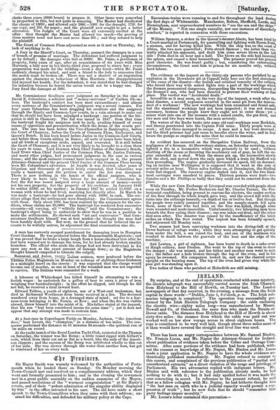tht Vrouittrts.
Sir Harry Smith was warmly welcomed by the authorities of Ports- mouth when he landed there on Sunday. On Monday morning the Town-Council met and resolved on a complimentary address, which they went and formally presented:to him; and in the evening the townsmen met in a great public assembly on the sudden summons of the Mayor, and passed resolutions of the "warmest congratulation" at Sir Harry's return, and of their "ardent admiration of the singular ability displayed by him" in the office intrusted to his care. The old hero made a short speech to the Town-Councillors when they came with their address ; ex- ained his difficulties, and defended his military policy at the Cape.
Excursion-trains were running to and fro throughout the land during the first days of Whitsuntide. Manchester, Bolton, Sheffield, Leeds, and Birmingham, sent unprecedented numbers to "see the sea and the ships" off the Mersey. "Not one single casualty, nor one instance of disorderly conduct," is reported in connexion with these excursions.
William Spencer, a stoker in the Queen's steamer Alecto, has been tried by a Court-martial at Portsmouth, for quarrelling and fighting with Norris Potts, a seaman, and for having killed him. While the ship was on the coast of Africa, the two men quarrelled ; Potts struck Spencer ; the latter then vio- lently attacked his opponent, and dealt him some severe blows in the left side : Potts died in an hour and a half. The blows on the side had lacerated the spleen, and caused a fatal hcemorrhage. The prisoner proved his general good character. He was found guilty ; but, considering the extenuating circumstances, the Court sent him to prison for six months only, without hard labour.
The evidence at the inquest on the thirty-six persons who perished by an explosion in the Downbrow pit at Coppull fully bore out the first statement of the cause of the disaster—the foolish and criminal temerity of the colliers, who forced their way with naked lights into a part of the workings which the fireman pronounced dangerous, disregarding the warnings and threats of the fireman's son, who had been directed to prevent their working at that place. The verdict was "Accidental death." Incredible as it may seem, on the very day of the inquest, a week after the fatal disaster, a second explosion occurred in the same pit from the miscon- duct of a workman! The new workings had been examined and found safe, but the abandoned workings had not been inspected ; it was not deemed necessary, because the people knew they ought not to enter them : yet a miner went into one of the recesses with a naked candle, the gas fired, and two men and two boys were burnt, the men severely.
The waters of the Roche broke into some old coal-workings near Rochdale, and thence penetrated into the Captain Fold mine. Thirty people were at work ; all but three managed to escape. A man and a boy were drowned; but the third prisoner had just room to breathe above the water, and in four hours the pumps so emptied the mine that he could be rescued.
An accident has occurred on the Shropshire Union Railway, from the negligence of a fireman. At Shrewsbury station, on Saturday morning, a man lighted a fire in a locomotive which was presently to be used ; without shutting off the steam or throwing the machinery out of gear, he left the en- gine untended in a shed. When the steam got up, the locomotive slowly left the shed, and moved down the rails upon which a train for Stafford was then proceeding. The engine gradually increased its speed, till on descend- ing an incline near Wellington it is supposed that it went at the rate of seventy miles an hour. Three miles farther on, at Donnington, the Stafford train had stopped. The runaway engine dashed into it, and the two hind- most carriages were smashed to pieces. Thirteen persons were hurt—two females and a Mr. Phillips so badly that they could not be removed from the place.
While the new Corn Exchange at Liverpool was crowded with people about noon on Tuesday, Mr. Forbes Mackenzie and Mr. Charles Turner, the Pro- tectioniat candidates, being present to canvass the electors, the centre section of the floor through its whole length gave way, and the crowd fell with the ruins into the eellarage beneath,—a depth of ten or twelve feet. But though the people were rudely jammed together, and the sample-stands fell upon them, none of those who had been on the floor was killed, though some were wounded and made insensible. Unfortunately, two labouring men were beneath the floor eating their dinners ; one was taken out dead, and the other died soon after. The disaster was caused by the insufficiency of the brick arches on which the floor rested. The inquest has been formally opened, and adjourned till Monday next.
Two seamen had been conveying workmen into the diving-bell at the Dover harbour of refuge works while they were attempting to get quickly from under the bell, a sea raised the boat, and one of the mariners AM crushed to death between the gunwale of the boat and the edge of the
machine. - - -
Kin fowten, a girl of eighteen, has been burnt to death in a coke-oven at Haigh colliery, near Preston. She went to the top of the oven to draw the damper ; she was missed, and her father and another man went to seek her ; the father saw a hole broken through the top of the oven, and in his agony he swooned. His companion looked in, and saw the charred corpse upright on the burning mass. The top of the oven had given way while the poor girl was standing upon it.
Two bodies of those who perished at Holmfirth are still missing.


























 Previous page
Previous page